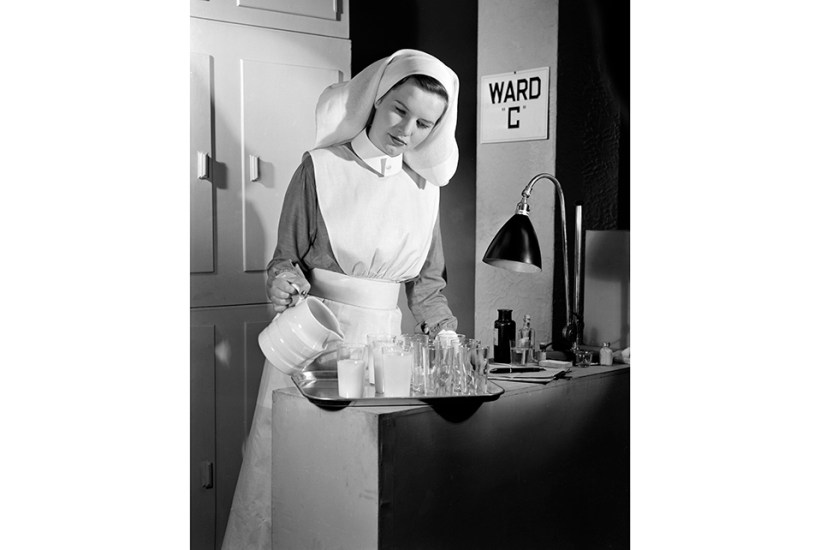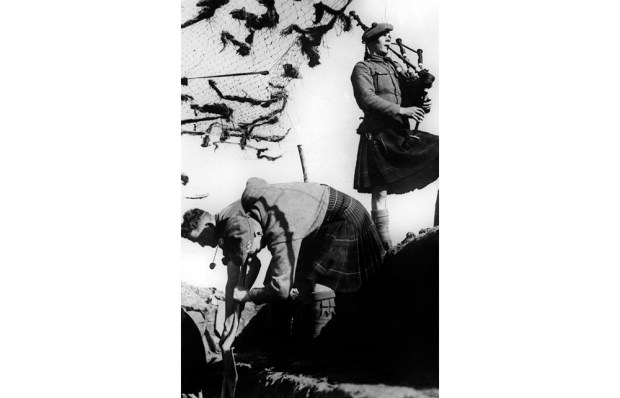For fans of Ysenda Maxtone Graham’s unique blend of high comedy and shrewd social observation, a new book is cause to leap on to the nearest chair and emit several loud shrieks. Jobs for the Girls is the third in the author’s trilogy on ‘lost worlds of Britain’. These are recent, touchable lost worlds, she stresses in her introduction, ‘still in living memory’, as recalled vividly – and often hilariously – by people who were there in her earlier books, Terms and Conditions, about life in girls’ boarding schools, and British Summertime Begins, on what children from all walks of life got up to in the school holidays.
Jobs for the Girls picks up where they left off, with Maxtone Graham’s antennae homing in on early adulthood. The book thrums with life and noise: the juddering of factory machinery, the clack-clack of manual typewriters, the whirring of early Roneo copiers. Did ‘some of the character and fun go out of office life’ when this clattering was reduced to ‘eerie silence’ by the email age, the author wonders. Any wistfulness for this lost world is parked early on, subsumed by a simmering rage as we learn that both the chronically undereducated boarding school girls of Terms and Conditions and their secondary modern sisters were ‘thwarted before they started’ in the workplace.
‘There’s no point in your having a career, because you’re perfectly bedworthy and you’ll get married,’ was one father’s bluff advice to his daughter. Meanwhile, the ‘tap of career opportunity’ was simply ‘switched off’ by schools that had excised maths and sciences from the curriculum to keep girls ‘safely in the “nurse” rather than “doctor” camp’. As late as the mid-1970s, the headmistress of St Mary’s, Ascot was telling parents: ‘Really, we want most of our girls… to marry into the Foreign Office.’ Even grammar school girls were more likely to be funnelled into a secretarial rather than an Oxbridge college, typing in time to Sousa’s marches at the Ox and Cow, as the Oxford & County secretarial college was known, with more than a hint of ingrained misogyny.
Once they’d taken baby steps into the world of work, women were up against antediluvian attitudes. From the man who signed leaving cards ‘All the breast’, to the surgeon who told a nurse that women were ‘temperamentally and physiologically unsuited’ to his profession, the reader is more likely to howl with outrage than with the mirth of Maxtone Graham’s earlier social histories. There are the merchant banks refusing to interview women as recently as the early 1980s, the Foreign Office marriage bar (not dismantled until 1973) and careers advisers refusing to send undergraduates to ‘milk-round’ interviews, ‘because women can’t go into industry’.
Among the jaw-dropping iniquities there is light relief in the absurdities that Maxtone Graham is so good at drawing out of her confidantes. We have Ted Heath falling asleep during an interview, the BBC secretary who ordered 666,666 bulldog clips when a typewriter key got stuck, and the author herself being promised a turkey at Christmas to compensate for the tiny salary of her first job at Christie’s in the 1980s. (Men weren’t offered one: ‘They were on a different pathway from day one’, she discovered.) But if the spirit of Barbara Pym – whose sense of high comedy the author shares – is present, it is the late Pym of Quartet in Autumn, shot through with sadness, poignancy and regret for lives lived in the slipstream of men. ‘Why did I even become a secretary?’ asks one Oxford graduate – the lot, Maxtone Graham argues, of a generation ‘drip-fed with a sense of their own lack of usefulness’.
Yet despite the obstacles, this lost world did possess a certain ‘porousness’ and the sparkier – or luckier – young women could take advantage of it. With a toe in the door as a secretary, they might just ‘float up between translucent layers of job titles until, by some miracle, they found themselves producing television programmes, editing books or actually being lawyers’. The TV producer Amanda Theunissen and the publisher Rosie de Courcy (both familiar cast names from Maxtone Graham’s earlier books) took the secretarial route to the top – a feat unthinkable now, with dreary HR departments and diversity targets.
With freshness and immediacy, Jobs for the Girls illuminates a period of our very recent history in which the word ‘jobs’ was suspended between inverted commas by one headmistress – to denote their new-fangled, slightly comic nature. In the bottom-pinching it recounts (perhaps not as endemic as we might have thought) and jobs that materialised through ‘a tap on the shoulder in church’, it reminds us that current handwringing about #MeToo and ‘nepo babies’ is nothing new, while this ‘Generation Rent’ has it far easier than those poorly paid secretaries sharing insalubrious digs in the 1960s, who survived on ‘left-over Christmas cake’ and dinners out that were paid for by men.
Maxtone Graham has an innate gift for a memorable phrase – the image of a Tippexed ‘heavily corrected sheet of foolscap’ with its ‘dandruffy weight’ stayed with me for far longer than I’d have liked – and an Alice-like ability to point out the absurd. How extraordinary, she concludes, that 50 years later the ‘very same social class of parents [who damped down girls’ expectations] would be paying vast sums for tutors to help their daughters up the ladder of opportunity’.
Got something to add? Join the discussion and comment below.
Get 10 issues for just $10
Subscribe to The Spectator Australia today for the next 10 magazine issues, plus full online access, for just $10.
You might disagree with half of it, but you’ll enjoy reading all of it. Try your first month for free, then just $2 a week for the remainder of your first year.














Comments
Don't miss out
Join the conversation with other Spectator Australia readers. Subscribe to leave a comment.
SUBSCRIBEAlready a subscriber? Log in